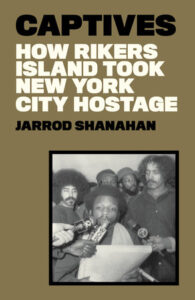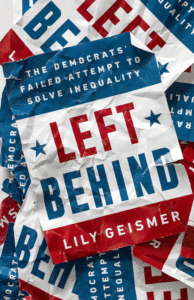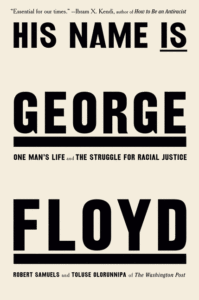
5 Book Reviews You Need to Read This Week
“The plot twist, when it arrives, is not in itself ridiculous but the execution is.”
 Our F5 tornado of terrific reviews this week includes A. O. Scott on Werner Herzog’s The Twilight World, Brendan O’Connor on Jarrod Shanahan’s Captives, Alex Pareene on Lily Geismer’s Left Behind, Imbolo Mbue on Robert Samuels and Toluse Olorunnipa’s His Name is George Floyd, and Johanna Thomas-Corr on Fiona Snyckers’ Lacuna.
Our F5 tornado of terrific reviews this week includes A. O. Scott on Werner Herzog’s The Twilight World, Brendan O’Connor on Jarrod Shanahan’s Captives, Alex Pareene on Lily Geismer’s Left Behind, Imbolo Mbue on Robert Samuels and Toluse Olorunnipa’s His Name is George Floyd, and Johanna Thomas-Corr on Fiona Snyckers’ Lacuna.
Brought to you by Book Marks, Lit Hub’s “Rotten Tomatoes for books.”
*

“Beyond their home country, these men have come to serve as illustrations in an informal dictionary of received ideas, accompanying the entries for fanatical loyalty, fighting the last war, and general cluelessness. The guy who stays in the field long after the war is over is, to modern eyes, a comical, cautionary figure, an avatar of patriotism carried to ridiculous extremes. We rarely pause to look for motives other than blind obedience, or to imagine what those years of phantom combat in the wilderness must have felt like. In making Onoda the subject of his first novel—a slender chronicle rendered in efficient, idiosyncratic English prose by the poet and translator Michael Hofmann—Herzog declines to treat him as a joke. He is clearly fascinated by the absurdity of this hero’s situation, and also determined to defend the dignity of a man who had no choice but to persevere in an impossible mission … As Herzog imagines him, Onoda operates on a wholly different level, his tactical acumen and delusional certainty infused with a pure warrior spirit. Rather than dramatizing those ambushes and similar adventures, The Twilight World emphasizes the existential dimensions of Onoda’s strange, looping odyssey in language that often veers from the concrete data of jungle sounds and smells into dizzying abstraction … Herzog is not interested in psychological or historical realism, or for that matter in literal facts, but in ‘ecstatic truth,’ a quality that almost by definition eludes classification, residing as it does in a vatic realm of images, experiences, and feelings … his celebrity, his pop-culture ubiquity, shouldn’t diminish the power or domesticate the strangeness of his work, which amounts to a defense of individual idiosyncrasy—not only his own—in the face of standardization, groupthink, and cultural practices that are accommodating in the worst sense of the term. The Twilight World strikes me as too flimsy, too elliptical to count as essential Herzog, but it did send me back to his films with a renewed appreciation of what they put at stake and why they matter.”
–A. O. Scott on Werner Herzog’s The Twilight World (The Atlantic)
“Since the start of the Covid pandemic, New York City’s jails have become significantly more dangerous and miserable places to be … Shanahan’s Captives identifies Rikers Island as the black hole at the heart of the city, something like Times Square’s ‘necessary opposite,’ summoned up out of the muck and mire of the East River … Shanahan, who was arrested and held on Rikers during the anti-police rebellion that followed Michael Brown’s killing in 2014, tells the story of how the island, once imagined as a space of reform and rehabilitation, came instead to be ‘the domain of a violent custodial force that demanded—and won—almost-untrammeled recognition of their freedom to dispose of the city’s prisoners however they saw fit’ … Abolitionists and other radicals opening this book might expect a history of prisoner rebellions and revolts, and these stories are present. But for Shanahan, the key antagonism in the city’s jails has in fact been that between guards and management. Captives is, in effect, a labor history: a history of guards in New York City’s jails generally, and on Rikers specifically, struggling for autonomy over their workplace—which is to say, for the right to deal out violence with impunity—against the managers, politicians, and judges seeking to impose their own ideas about how the city’s carceral institutions ought to be run … it is also a history of the changing nature of the state—specifically, the rise of the neoliberal carceral state out of the ashes of the liberal welfare state … The ongoing crisis at Rikers is not a matter of the mask slipping and the true, oppressive essence of the state revealing itself; it is the result of an organized force seizing control of a set of institutions that it could use to accrue even more political capital and influence to itself. Like cops, prison guards use violence to build power to use more violence. As a group of Black Panthers warned their fellow prisoners who wanted to negotiate the release of several guards taken hostage during one rebellion: ‘Listen brothers . . . we’ll go along with the majority because we don’t want to fight you, but the pigs are gonna fuck you up anyway.’”
–Brendan O’Connor on Jarrod Shanahan’s Captives: How Rikers Island Took New York City Hostage (The Baffler)
“The ‘New Markets’ tour was meant to be a sales pitch for an anti-poverty program. The historian Lily Geismer presents it as, instead, a tour of the wreckage of Bill Clinton’s presidency and a window into the blinkered ideology of his broader political movement. Her new book, Left Behind: The Democrats’ Failed Attempt to Solve Inequality, should make almost any left-of-center reader retroactively furious about the 1990s and the inability of its architects to foresee the twenty-first century they were creating … Left Behind asks that we judge these winners not by their political victories, but by whether their ideas actually worked in practice. The judgment is not kind … Left Behind should spur serious soul-searching among the American center-left. It is a book about well-intentioned policy not working out, but also about blasé indifference of policymakers as to whether their policies worked or not, and whether the point was for them to ‘work’ for the people affected by policy or for ideas to work in a speech … Clintonites were convinced of their altruism while designing and selling their plans with undisguised nasty paternalism. And it seems they never decided if (or came to an agreement on whether) their program was a genuine effort to address America’s problems or a political exercise in winning a political base.”
–Alex Pareene on Lily Geismer’s Left Behind: The Democrats’ Failed Attempt to Solve Inequality (The New Republic)
“Samuels and Olorunnipa deserve every praise for presenting Floyd as the complex character that he was—what human isn’t? Both writers are Black men and could easily have diluted portions of the book that show Floyd’s many shortcomings and poor decision making, but they resisted the urge. The result is an expertly researched and excellent biography, a necessary and enlightening read for all, especially those who, like my fellow African immigrants in the ’90s, have ever looked upon young Black men in the inner city with disdain … it is confounding that the authors shy away from more pointedly calling out the hypocrisy of governments and corporations and all manners of institutions that immediately took the knee, vigorously condemned Chauvin, and pledged their allegiance to anti-racism, not because it was just but because it suited them. The authors know this, and yet a good portion of this book is spent on the Chauvin trial and the theatrics of the aftermath of the killing, as if all the superficial changes in the world will prevent future tragedies of this nature … Perhaps I am transferring my disappointment with America onto Samuels and Olorunnipa. Perhaps I am unfairly asking them to do more than bear witness. I imagine they would say, in their defense, that putting America on trial for the death of George Floyd is an impossibility, and beyond the scope of this book. Fair enough, but deep down I know, many of us know, that even with Chauvin in prison, justice has not been fully served. Those entities that created the conditions for Floyd’s death carry on. They thrive. Their next victim awaits … This, perhaps, was why at the end of reading this book, I felt nothing but a deep exasperation.”
–Imbolo Mbue on Robert Samuels and Toluse Olorunnipa’s His Name is George Floyd: One Man’s Life and the Struggle for Racial Justice (The Atlantic)

“Lacuna opens with an extremely peculiar author’s note…Can you imagine if all authors framed their books in this way? ‘Anna Karenina will make some bad choices in this book.’ ‘Captain Ahab acts out a damaging form of masculinity that does not take into account the feelings of the whale.’ It may be that such prescriptions are more common in young adult fiction, where Snyckers made her name, but her tone reminded me more of a Soviet compendium of English writers that my husband once brought back from Russia, which introduces Wilde, Waugh and Wells with stern warnings about how a good communist is expected to interpret them. Only: what are we to make of her insistence that this victim of gang rape is ‘solipsistic and selfish’? Is this some kind of postmodern joke? I don’t know. Despite the fact that Lacuna is more heavily signposted than the M25, I’m still not entirely sure what it’s trying to say. It purports to be a feminist response to Coetzee’s novel, but it muddies the waters by rewriting the story of Disgrace and its invention in several fundamental ways … The plot twist, when it arrives, is not in itself ridiculous but the execution is, mainly because Snyckers is too caught up in her political messaging to explore the emotional implications. She seems to imagine that giving voice to a rape victim means reducing all the other characters to crude antagonists.”
–Johanna Thomas-Corr on Fiona Snyckers’ Lacuna (The Guardian)
Book Marks
Visit Book Marks, Lit Hub's home for book reviews, at https://bookmarks.reviews/ or on social media at @bookmarksreads.






















